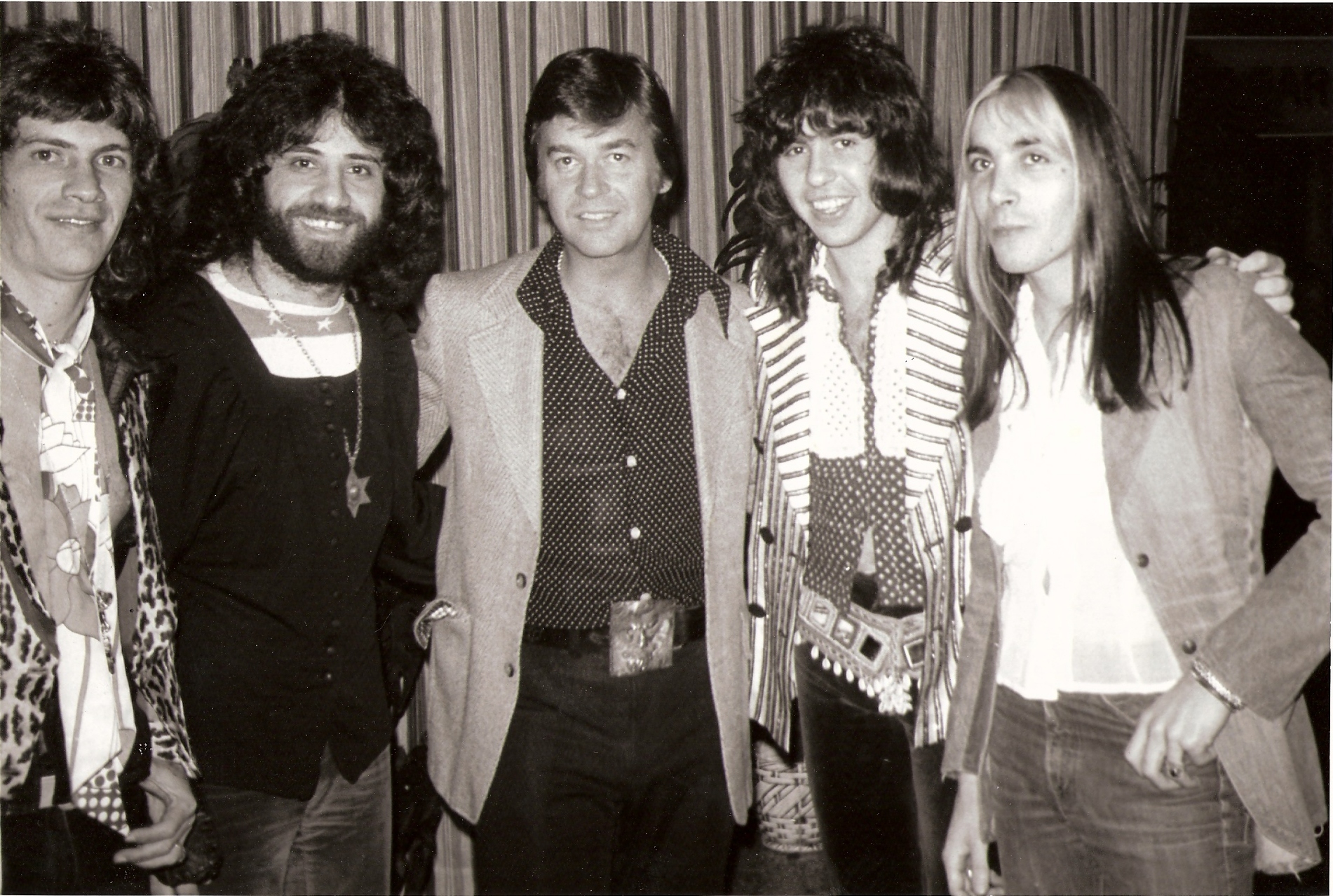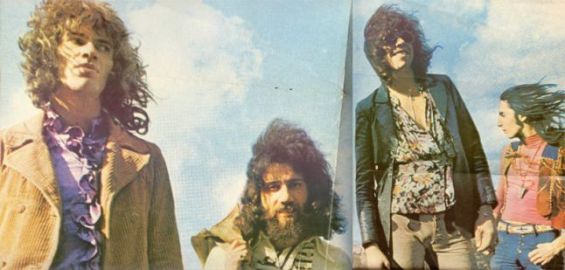They were proud French-Moroccan rockers that rose to fame between the late 1960s and 1970s. The Variations rock band, those 70s rock stars, drew inspiration from big names like the Rolling Stones, MC5, The Who, and Led Zeppelin.
But their music was unique, as it thrived to represent their Moroccan roots. Formed in 1963, The Variations consisted of three Moroccan Sephardic Jews: Marc Tobaly (guitar), Jacky Bitton (drums), and Jo Leb (vocals). The fourth member, Jacques Grande, who played the bass, also known as P'tit Pois, was of Italian descent.
Living in France, The Variations debuted by playing covers of rock and roll songs. Later, they started writing their own songs, participating in the Tremplin du Golf Drouot, a prestigious French rock competition. This led to a recording contract with Pathé Marconi.
From young music fans to European stars
But before attracting the attention of European rockers, members of The Variations were just young music aficionados.
Interviewed by Jukebox Magazine, Marc Tobaly speaks of his background. The Morocco-born guitarist recalls how his love for music stemmed from his family. Marc Tobaly's family lived in Fez, where he and his friends, the Costa brothers, were surrounded by music from a young age.

His grandmother, Zohra El Fassia, was a famous Oriental region singer. Before The Variations, Tobaly and his younger friends formed «Les P'tits Loups», playing instrumental covers by The Shadows and The Ventures, as well as Beatles and Rolling Stones songs before they disbanded in 1964.
During the same year, Tobaly visited a cousin in Casablanca and met Jo Leb, who would later become The Variations' lead singer. «A friend in common introduces us to Jo Leb, a crazy character who breaks everything when he's on stage», recalls Tobaly.
«In the afternoon, he keeps his father's garage, where we go and have a laugh with him, playing stuff by the Stones, then little known in Morocco. I bring a guitar. With the rulers he borrows from the office, Jo bangs on drums».
During a show in Casablanca, Tobaly discovered Jacky Bitton, who later became the band's drummer. «That night, their drummer played a monstrous solo. What the hell! Right away, I love this drummer. At the end of the concert, I even ask him for an autograph, which I never get because there are too many people and I have to leave. That drummer is Jacky Bitton», he said.
In 1966, Tobaly had to immigrate to the United Kingdom. «I have six brothers and sisters, all of whom have gone to live in France, the USA and so on (...) At the beginning of July 1966, having earned a little money playing in the Zallagh swimming pool, I come to Paris to join my brother Alain, who is seven years older than me, for the holidays», the rocker said.
«Arriving from Morocco, I feel like a provincial: I've been hearing about Paris, the stars, the Chaussettes Noires, the Golf Drouot and so on for so long. It all seemed untouchable».
Gigs in London
On the day of his arrival in Paris, the guitarist learned that he had to move to London with his brother and sister Alain and Magda. Together, they lived in a small apartment. While Alain, who was also a music aficionado, worked in a coffee shop, Tobaly began playing in Piccadilly Circus and at an Italian restaurant called the Papagayo.
«I do Beatles songs, which I have to spice up with a few Italian titles like ‘Come Prima’ or ‘Non Ho L'Eta’ ... It's a crazy time when everything seems wonderful. This little commitment kept me going financially», he said.
In London, the young Moroccan felt immersed in the vibrant music scene of the foggy city, including Carnaby Street and bands like The Creation.

In September 1966, and after a summer full of music, Tobaly was supposed to return to Morocco for school. But his love for music urged him to stay. «I was supposed to return to Morocco for the start of the school year, but I decided to stay in Paris, despite the pain it would cause my parents», he regretted.
Marc and Alain stayed in Paris, while the older brother resumed law studies, the younger tried his luck at music. «We lived in a small studio on rue de l'Ouest. My first attempts with local bands were disappointing, as I was the one showing the others what to do. The level is too low. These are lean times. We eat two eggs a day and pasta», he recalled.
The rise of The Variations
Marc decided it was time to form a band, and things arranged smoothly. In 1967, Tobaly formed The Variations with Jacques Grande, Jacky Bitton, and Jo Leb.
Alain and Marc found Jacky Bitton through an ad, recognizing him as the talented drummer from their days in Morocco. Later, after numerous unsuccessful auditions, they landed on the energetic Jo Leb as the band's vocalist. Alain had met Jo Leb unexpectedly in a cafe and convinced him to try out after he left Morocco for Nice to study. As for Jacques Grande, of Italian origin, they met at a bar in December 1966 after they tried to play for the first time.
They then started rehearsing, playing a mix of rock and roll, R&B, and soul music, influenced by artists like Otis Redding, Wilson Pickett, The Lovin' Spoonful, Chris Montez, and The Rolling Stones.
They quickly gained a following and became one of the most popular rock bands in France. In December 1966, they participated in the Tremplin du Golf Drouot. «Many of the leading figures in the Paris rock scene were present. Serge Morali (Jacques' brother), manager of the Music Center store on rue de Douai, was one of the judges, and said after our performance: ‘From the first note, we knew who was going to win. I can't begin to describe the joy and happiness this victory brought us’», Marc recalled.
Scandinavia and Moroccan roots
After their success in Paris, the band embarked on an adventurous European tour, seeking musical opportunities. After a wardrobe makeover from the trendy boutique Compton, enhancing their stage presence, The Variations hit the road for Scandinavia.
In a Volkswagen bus, Marc recalls, the band stopped in Hanover, Germany, where they were greeted by a thriving beat music scene. Spotting a poster advertising The Smoke at the Savoy club, they boldly approached the manager, securing a trial gig that same evening.
Continuing their journey, they adopted a routine of using train stations for grooming and preparation, dressed in their stylish Compton outfits. Each stop brought new opportunities to perform, showcasing their talent and earning them enthusiastic reactions.
This European adventure was a turning point for The Variations. It forged a strong bond between them, gave them valuable stage experience, and helped shape their musical identity. They faced some bumps along the road, but the overall experience was filled with adventure, great music, and personal growth.
After their successful Hanover gig, The Variations embarked on a European tour, sleeping in their Volkswagen bus and performing at local clubs. They recorded their first single, Mustang Sally / Spicks And Specks, in Copenhagen. Their reputation grew, and they played at the prestigious Hit House club in Copenhagen.
In December 1967, they returned to France, where they participated to the Surprise-Partie TV show. The show aired on New Year's Eve 1968, exposing The Variations to a national audience.
The day after the broadcast, record labels came knocking. They signed with Claude Ébrard, who represented Robert Stigwood Organisation in France.
Claude Ébrard produced them and negotiated a licensing deal with Pathé Marconi. Andrew Jakeman, a resourceful manager, joined the team.
Then, their first single, Come Along / Promises, was released in March 1969. They performed at Johnny Hallyday's Palais des Sports show in April 1969, gaining exposure and recognition.
Their second single, What's Happening / Magda, was released in September 1969. By the end of that year, they embraced international exposure by performing as the opening act for Led Zeppelin on New Year's Eve.
Although, they lived in Europe, the band insisted on embracing their Moroccan roots. Their first album was called Nador. Released in October 1970, it featured original compositions.
But their choice to sing in English and not French did encourage their decision to move to the United States, where they never achieved significant success. The Variations broke up in 1973, leaving behind a legacy that both marked the Moroccan, French and international music scene at the time, paving the way for other young rockers to embrace the Moroccan Roll.





 chargement...
chargement...












